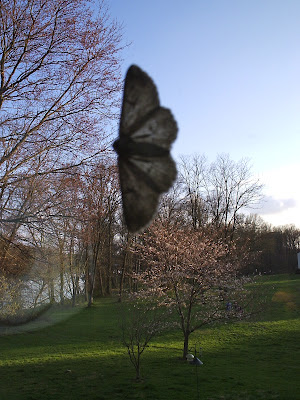 |
| "March Moth" photo credit: Jan Bowman 3/30/12 |
This week I have reread for the third time Marilynne Robinson’s online Paris Review Interview in Issue 186, No. 198, Fall 2008 – “The Art of Fiction” and once again I come away with new and powerful impressions that I share with you. Here are some gems to consider:
“…proceed from the assumption that the distinctions available to us in this world are not arranged between good and bad, but between bad and worse.”
“…I cherish time, for instance, and for the most part, I have control over my time, which is a marker of a very high standard of living as far as I’m concerned. At some point I created an artificial tropic for myself, where I could do exactly what I wanted to do and be rewarded for it. There’s a puritanical hedonism in my existence.”
“…I’ve almost never done anything that I didn’t want to do. My life has been laid out to satisfy any aspirations of mine to the power of ten or a hundred. I can only make sense of my unaccountable good fortune by assuming that it means I am under special obligation to make good use of it.”
In that Paris Review interview, Robinson was asked to respond to this question: “You’ve written that Americans tend to avoid contemplating larger issues. What is it that we’re afraid of…”
Her response: “People are afraid of themselves…The ancients are right: the dear old human experience is a singular, difficult, shadowed, brilliant experience that does not resolve into being comfortable in the world. The valley of the shadow is part of that, and you are depriving yourself if you do not experience what human kind has experienced, including doubt and sorrow. We experience pain and difficulty as failure, instead of saying, ‘I will pass through this, everyone I have ever admired has passed through this, music has come out of this, literature has come out of it. We should think of our humanity as a privilege.’”
As a reminder to readers: Robinson wrote about the Sellafield Nuclear Plant in her nonfiction book, Mother Country in 1989 and she describes how the plant off the coast of England polluted the sea since 1956, as it extracted plutonium 239 and sent vast quantities of radioactive wastes into the sea.
Among fiction readers in the US, she is most widely read for her remarkable fiction works: Housekeeping, Home, and Gilead. But if you’d like to think for days about something you’ve read, I highly recommend, The Death of Adam: Essays on Modern Thought. Sometimes it is worth the time and effort to dig deep and think about what writers bring to us all, if we would only read what they have to say about our world. But then, not everyone reads. Some just talk about it as if they had read.
Here's a passage from Home that I like: "They sat waiting for him, and in a few minutes he came back with a handful of sweet peas in a water glass, which he put down in front of Lila. 'We can't have Mrs. Ames as our guest and no flowers on the table!' he said. 'It's not much of a bouquet. A little better than nothing, I hope.'" It's at first glance simple and yet - powerful and revealing about people and culture. Sometimes less is so much more.
So what matters to you as a writer?
No comments:
Post a Comment